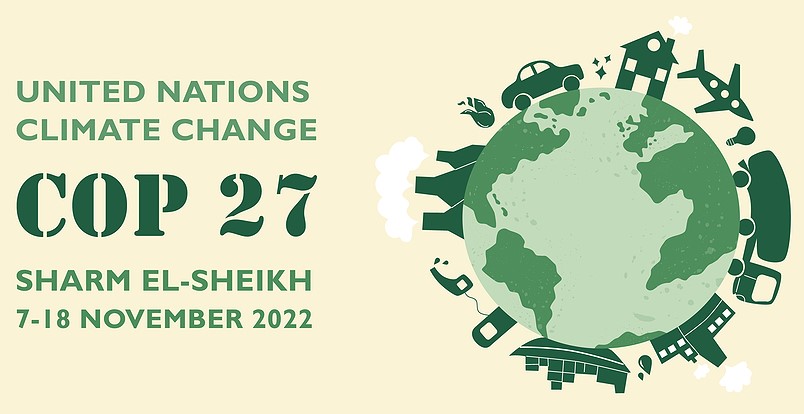News
COP27 Gets Underway In Egypt
The United Nations Climate Change Conference COP27 opened on November 6th, with the aim being to ensure that the ambitions set out in the Paris Agreement are fully implemented.
The importance of this has been emphasised in particular this year, with 2022 bearing witness to a series of climate change-related events over the last 12 months, ranging from floods and unprecedented heatwaves to storms and severe drought conditions.
Despite the fact that the impacts of climate change are being felt with increasing regularity and increasing strength as time goes on, it seems that insufficient action is still being taken to reduce greenhouse gas emissions, which is crucial to avoid the worst effects of climate change such as more frequent and severe rainfall, heatwaves and drought.
The UN’s Intergovernmental Panel on Climate Change now asserts that CO2 emissions will need to be slashed by 45 per cent come the year 2030 compared to 2010 levels in order to hit the Paris Agreement goal of limiting temperature rises to 1.5 degrees C by the end of the century.
However, a recent report from UN Climate Change – released ahead of COP27 – has revealed that although nations around the world are driving down CO2 emissions, the measures being implemented are still not enough to keep global warming to 1.5 degrees C within this timeframe.
Since last year’s conference, which was held in Glasgow, just 29 out of 194 countries have been forthcoming with tighter national climate change plans.
One possible driver for this could be the converging impacts of different crises around the world, including energy, food, water and the cost of living, exacerbated by geopolitical conflict and tension. With this as the backdrop for COP27, some countries have begun reversing or stalling climate policies and increasing their usage of fossil fuels.
Opening the conference, UN Climate Change executive secretary Simon Stiell called on governments around the world to focus on three key areas: a transformational shift towards implementing the Paris Agreement goals and turning negotiations into action; cementing progress on mitigation, adaptation, finance and loss and damage; and delivering on transparency and accountability throughout the UN Climate Change process.
An ambitious vision has been set out for COP27, with the Egyptian Presidency keen to draw the world’s attention to the main elements that address the fundamental needs of human life, including water, food, health and energy security.
Mr Stiell said: “With the Paris Rulebook essentially concluded thanks to COP26 in Glasgow last year, the litmus test of this and every future COP is how far deliberations are accompanied by action.
“Everybody, every single day, everywhere in the world, needs to do everything they possibly can to avert the climate crisis. COP27 sets out a new direction for a new era of implementation: where outcomes from the formal and informal process truly begin to come together to drive greater climate progress – and accountability for that progress.”
Sameh Shoukry, COP27 president and Egyptian minister of foreign affairs, made further comments, saying that the conference is being held “at a time when global climate action is at a watershed moment”, with multilateralism being challenged by financial crises, spiralling prices and geopolitics, as well as the lasting legacy of the pandemic and climate-related disasters increasing in frequency.
He added that COP27 represents an excellent opportunity for the world to come together and increase action against climate change, ensuring that multilateralism works by restoring trust and collaborating at the highest of levels.
Aspiration vs reality
It will certainly be interesting to see what happens in the year ahead following COP27, but what is becoming evermore clear is that there is an ever-increasing gap between global climate change aspiration and the actual reality of the situation.
A new multi-agency report, coordinated by the World Meteorological Organization, has just revealed that unless more ambitious action is taken, both the physical and socioeconomic impacts of climate change will become more and more devastating as time goes on.
The United in Science report indicates that concentrations of greenhouse gas continue to climb to record highs, with fossil fuel emission rates above pre-pandemic levels following a temporary drop during the various periods of lockdown.
Furthermore, emission reduction pledges for 2030 would need to be seven times higher in order to hit the 1.5 degree C Paris Agreement goal.
Increasing socio-economic impacts will be felt by cities hosting billions of people, while the most vulnerable populations around the world will suffer the most, according to the report.
Extreme storms, wildfires, heatwaves, droughts and floods are all now going from bad to worse and taking place with “alarming frequency”, such as the Europe heatwaves seen this year, the floods in Pakistan and the prolonged droughts in the Horn of Africa, the US and China.
Antonio Guterres, UN secretary-general, commented on the findings, saying: “There is nothing natural about the new scale of these disasters. They are the price of humanity’s fossil fuel addiction.
“This year’s United in Science report shows climate impacts heading into uncharted territory of destruction. Yet each year we double down on this fossil fuel addiction, even as the symptoms get rapidly worse.”
The report concludes by saying that the science is now very clear… urgent action is required to mitigate greenhouse gas emissions and adapt to a changing climate.
The last seven years have been the warmest on record and there’s now a 48 per cent chance that at least one year in the next five years will see annual mean temperatures temporarily climb 1.5 degrees C higher than the 1850-1900 average. As global temperatures continue to rise, climate system tipping points cannot be ruled out.
Want to find out why water efficiency is important? Get in touch with the H2o Building Services team today.
